|
|
Doodles
|
There are an abundance of different types of Doodles, ranging from retracing
letters in a written or printed text to complex and three-dimensional drawings,
via a variety of idle scribbling.
The process of doodling appears to only be a partially conscious one. Not once does
it appear that the pen takes on a life of its own, and the "artist" himself is
surprised by the results.
One generally indulges in doodling while one's mind is on something else, rather
than on the actual matter of doodling. People doodle in various situations - for
instance, in the course of telephone conversations, lectures, while compiling
lists and making notes.
|
Doodles are assessed in much the same way as specimens of handwriting: by
examining the same indicators such as the layout on the page, the structure of
the stroke, movement, angles, roundness, and speed. However, the doodle cannot be
gauged by quite the same codes as those applying to handwriting analysis, and the
closest common component between the doodle and the person's handwriting is the
signature.
In a certain sense, the interpretation of doodles can be compared to the
interpretation of dreams in the course of psychological treatment. Deciphering a
doodle is not a simple task. However, it could serve the graphologist with an
important clue as to the direction of the analysis and its depth in the same way
as the dream serves a similar purpose to the psychologist.
Doodles carry a vast array of symbols, some clear and uncontestable, others obscure
and concealed. Tracing hearts often represents a romantic period; pistols and
arms could indicate overt of repressed aggression; boats and cars point to a
nomadic urge, the desire to travel and the need to go on holiday. It is only
people who are musically oriented who would trace musical notes and keys, and
people on a diet would often be inspired by food-related subjects in their
doodles. Drawing bars often points to a feeling of suffocation.
Significance of the position of the doodle on the page:
- CENTER - Extroversion, a need for attention, sensitivity to privacy, and the need for space.
- LEFT - Held by the past, drawn to the past, apprehensiveness, sensitivity, fear of being exposed.
- TOP - Enthusiasm, spirituality, and an unpractical approach.
- BOTTOM - A critical and practical approach, at times depression.
Shading-in of letters
At times, this is merely an expression of boredom, with no significance. At
other times, it can indicate anxiety, lack of self-confidence, tension, and
at times, a compulsive behavior and/or lack of faith in oneself.
Pressure
- HEAVY - could express energy, activity, at times aggression.
- MEDIUM - points to a well-balanced personality.
- LIGHT - could be evidence of sensitivity.
- IRREGULAR - might indicatethat the person's inner energy is not altogether regulated.
A lack of stability and frequent changes in moods, restlessness, and impatience.
Doodles can assist the Graphologist and serve as a clue regarding a person's
personality, or reveal a process being experienced by the "doodler"; but, as
mentioned above, it is not possible to perform a character analysis on the basis
of a doodle alone. It is strongly recommended to refer to the specimen of the
handwriting and look for pointers supporting manifestations revealed in the
doodles.
Common doodles
1. GEOMETRICAL SHAPES
 |
Triangles, squares, pattern formations: organized brain, clear thinking process and planning skills, meticulous planning on one's steps,
efficiency, purposefulness (Vertical, small and unconnected writing: sanguine
and\or phlegmatic - LE SENNE; thinking type - JUNG.)
|
2. VARIOUS TYPES
 |
Stars, sun, moon, celestial bodies: optimism, ambition, a need
to prove and advertise oneself (Large writing, large differences of lengths,
large initial letter, rising lines, choleric type - LE SENNE.)
|
3. ABSTRACT SHAPES
 |
Tension, difficulty and disturbances in concentration.
(Inconsistent spacing between words and letters, tense writing, erratic,
sentimental type - LE SENNE.)
|
4. GAMES
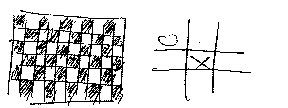 |
Noughts and crosses, chess: competitive, plays to win (Large
differences of lengths, quick writing, connected, connecting it's in different
parts of a word, connection between two words, impassioned and/or nervous types
- LE SENNE.)
|
5. DRAWING GOOD-LOOKING FACES
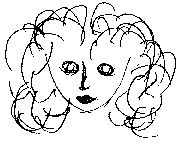 |
Love of people, sees the positive in people and
situations, optimistic, humane, good-natured, sensitive to his fellowmen,
capacity to show empathy, friendly, enjoys social activities and events (Large
text-middle zone, connected writing, medium right margins, rightward slant, choleric
type - LE SENNE; feeling-extravert type - JUNG). He is interested in other people,
has a need for closeness and social involvement. He has a keen sense for
aesthetics, sensitivity and consideration in others.
|
6. DRAWING FACES WITH OPEN MOUTHS
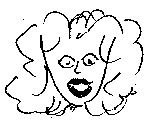 |
Talkative, loves the sound of his own voice.
(Invasive, large writing, connected, choleric type - LE SENNE.)
|
7. DRAWING UGLY FACES
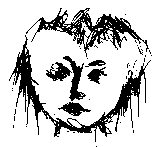 |
Suspicious, lacks "joie de vivre", bitter, dislikes
people, doesn't trust them, rebellious, lacks self-confidence, does not delegate and does not work
well in a team. Bad-tempered, feels offended and deprived. (Small writing,
narrow, tense, straight right margins, tension in the writing).
He has a negative approach, looks for the worst in everyone and every circumstance and
does not enjoy himself. He is highly judgmental, defensive, and tends to distort reality
as a result of his "dark" view of things.
|
8. ARROWS AND LADDERS
 |
Much ambition; a strong drive to prove himself; the end,
in his opinion, justifies the means. (Large differences of lengths, large
writing, impassioned type - LE SENNE).
Impatient for prolonged processes and aims for the nearest goal.
|
9. DRAWING HOUSES
 |
Search for a home. A need for family and willingness to invest in his family. A need for
a spiritual shelter and search of self. Feelings of insecurity (could be temporary).
|
10. MUSICAL NOTES
 |
Love of music.
|
11. REPETITIVE SHAPES
 |
Patience, perseverance, methodical, developed ability to
concentrate. (Homogeneous writing, stable, constant, phlegmatic type - LE SENNE.)
|
12. PLANTS, FLOWERPOTS, FLOWERS
 |
Friendly, sociable (motifs used extensively by social workers), sensitive, humane, warm, open. (Choleric type - LE SENNE.)
|
13. PUPPIES, CUBS, AND ANIMALS
 |
Likes to defend others (Social workers).
Love of animals, A need to take under his protection. Sensitivity, consideration.
Needs peace of mind.
|
14. HEARTS
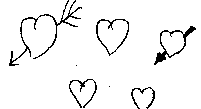 |
Sentimentalist; when in love, there is an understandable tendency to
sketch hearts.
|
15. VARIOUS TRAVEL VEHICLES
 |
Desire to travel, an urgent need for a holiday.
|
16. BOOKS BALANCED ONE ON TOP ON ANOTHER; BUILDING RESTING ON A BRICK OR TWO
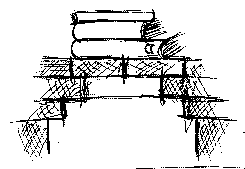 |
A person who is under great stress and under the impression that the smallest of
tremors might cause him to collapse.
|
17. FOOD
 |
Person who likes to eat or who is dieting. |
18. BARS
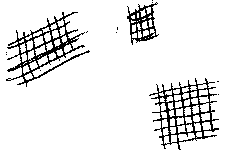 |
A sense of suffocation, a need to escape, a desire for freedom, a
feeling that his actions are restricted.
|
19. PISTOLS, CANNONS, SWORDS
 |
Competitiveness, the need to prove virility,
sexuality. (Lower zone which is very developed of inhibited.)
|
20. STAIRS
 |
Ambition, a need to advance.
|
21. PHALLIC SHAPES
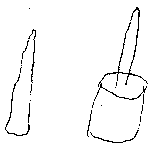 |
Strong libido, sexuality. A need to demonstrate masculinity.
|
Analysis of a sketch
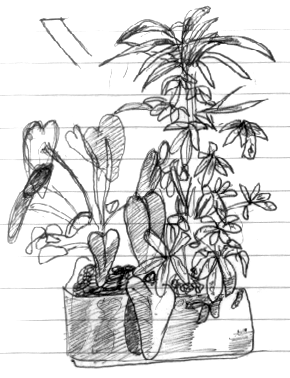 |
|
The sketch looks more like a painting. The "artist" painted an entire jungle inside the plant,
which reflects an overload of thoughts and emotions. Such overload makes it difficult for him
to think clearly. There is no ventilation in the painting and although the painting is about
flowers and plants, there are many thorns on the tip of the leaves, which appear to be heart
shaped. The stem pierces them.
When I told the artist that the hearts symbolize disappointment of women and aggression
towards them, he told me that his wife had left him for a younger man a month earlier,
and has taken their three little children.
He was very unstable and even thought about murdering his wife and the young man.
|
|